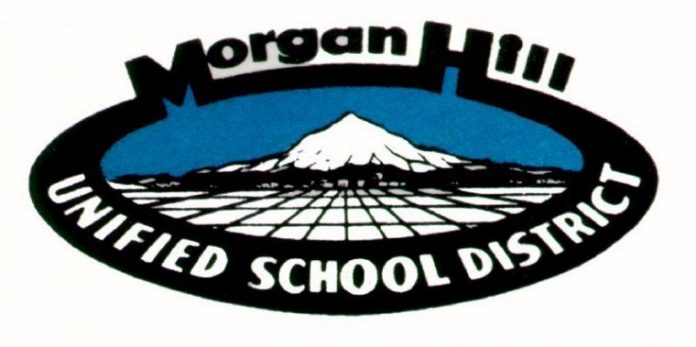Is location limiting the amount of student diversity at Charter School of Morgan Hill, and is there an ethnic or socio-economic divide between those families who are able to transport their children to and from the far-north campus and those who cannot?
Has Voices Academies upheld its end of a 2016 facilities settlement agreement, which included Morgan Hill Unified School District issuing the county-authorized charter a $125,000 lump-sum payment to upgrade its Morgan Hill campus?
MHUSD’s Board of Trustees briefly discussed these issues, as well as several others, at their Sept. 4 public meeting, under an agenda item tagged as “Charter schools in the MHUSD boundaries: Unresolved Issues.”
None of the issues were resolved Tuesday night, but trustees and district administration vowed to continue the conversation.
Trustee Gino Borgioli was the most vocal of the now six-member board (Trustee Tom Arnett’s seat will not be filled until after the Nov. 6 election). He wondered if the district’s stipulation that CSMH’s student population more closely reflect the Morgan Hill community as a whole was unreasonable to attain. Even a weighted lottery enrollment system, where better odds are given to socio-economically disadvantaged students who apply for charter, hasn’t made any dramatic changes.
“I don’t think you’re ever going to get a calculation of ethnic diversity at that school simply because of the location,” said Borgioli on the topic that also has delayed the signing of a Memorandum of Understanding between MHUSD and CSMH. “I don’t see any way as to how to move the needle.”
Trustee Donna Ruebusch doesn’t want CSMH’s location—nine miles down Monterey Road in south San Jose—to be the end-all, be-all as to why a family would not want to enroll their child. She disagreed with Borgioli that location was the culprit.
“I think all parents seek the very best for their children. We have a lot of choice within our district. … We bus kids all over the place (so) I don’t think busing or location is the issue,” Ruebusch said. “If a parent so desires to have their child be able to enroll at CSMH, we have to take away all barriers that might prevent that opportunity.”
Trustee David Gerard said it was not the charter’s fault that CSMH has such skewed student enrollment numbers, with only limited students who qualify for free and reduced lunch.
“The reason (for the disparity) is primarily the location,” said Gerard, who noted that charter parents that he spoke with aren’t to blame either. “They’re not segregationists. They’re trying to make the best decision for their child.”
Superintendent Steve Betando said CSMH leaders are scheduled to give their annual report to the board at the Sept. 18 meeting, and his staff would direct them to answer any questions the trustees posed regarding their enrollment strategy, finances and multi-year projections, movement toward an MOU and placing of an MHUSD representative on the charter school’s Board of Directors.
“We appreciate these questions and that’s the purpose of this agenda item,” said Betando of the agenda item that caused a bit of a stir among charter school proponents who thought the district was rehashing old issues.
CSMH Director Paige Cisewski did not attend the Sept. 4 meeting. However, after viewing the agenda online, she sent out a response to the MHUSD board and administration. In the letter dated Sept. 2, Cisewski said “these issues have either been completely resolved or are in discussions.”
“The inclusion of the first three items with no explanatory comments by the staff reflects very negatively on CSMH,” Cisewski wrote. “We believe the (MHUSD) Staff’s update on the current status of the stipulations from 2015, especially as they relate to the fiscal oversight responsibilities, will report that all stipulations have been met.”
Staff did not go over each issue listed on the report at the meeting and only answered inquiries made by trustees. Otherwise, they were told the charter leaders would address them at the next board meeting.
“(S)ince our Charter Renewal, the stipulations have all been completed or addressed and a very collaborative and productive working relationship has been developed to allow MHUSD to perform their important oversight role,” Cisewski noted.
While MHUSD is in charge of oversight for CSMH, it does not have the same responsibility when it comes to Voices, which was authorized through the Santa Clara County Board of Education. However, its founder, Frances Teso, was on hand Sept. 4 in an attempt to clear up any concerns trustees and district staff had about its inner workings.
Before Teso joined the conversation, however, Ruebusch—like district leaders—wanted to know “where the $125,000 was spent since it was supposed to go toward portables” at the former Advent Lutheran Church. The payment was part of a 2016 facilities settlement agreement between MHUSD and Voices.
“We are not in breach (of the facilities settlement),” said Teso, who shared that they are deciding on the best use of those funds including the installation of permanent walls, new flooring and lighting. “We have not used the money.”
Voices, which was previously located at Advent Lutheran Church at the time of the agreement, is now at the former Silicon Valley Flex Academy school building on Jarvis Drive.
Teso also attempted to clear up the district’s claim in their unresolved issues report that they have not notified MHUSD each time a student has left their school to elsewhere. That claim, as well as others involving Voices and CSMH, was part of a staff report attached to the online agenda posted on mhusd.org.








